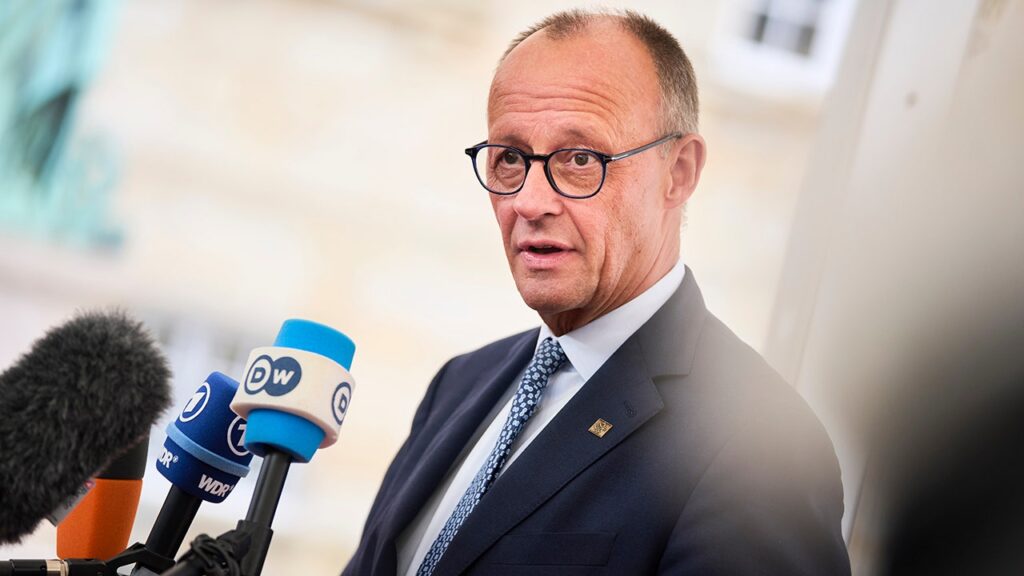In recent comments, German Chancellor Friedrich Merz reiterated his concerns about migration, claiming that many Germans feel unsafe in public spaces due to illegal immigration. This stance has been met with significant backlash, including accusations of racism from various political and social circles. Despite the criticism, Merz maintained his position, mentioning the need for strict immigration control and acknowledging the role of migrants in the German labor market during a whirl of political scrutiny.
| Article Subheadings |
|---|
| 1) Chancellor’s Stance on Migration and Safety |
| 2) Public Backlash and Political Ramifications |
| 3) The Role of Migrants in the Labor Market |
| 4) The Impact of Public Sentiment on Policy |
| 5) Future of Immigration Policy in Germany |
Chancellor’s Stance on Migration and Safety
During a visit to Potsdam, Chancellor Friedrich Merz articulated stark concerns regarding public safety and the implications of illegal migration in Germany. His statements reflect a broader sentiment expressed by many citizens who reportedly feel uneasy about their security in public spaces.
“Many people in Germany are fearful of moving around due to the presence of migrants who do not have permanent residence,”
he noted, emphasizing the perception that some migrants do not integrate into society as expected. His remarks have accentuated the ongoing debate around security and immigration policies within the country.
Public Backlash and Political Ramifications
The Chancellor’s comments sparked extensive backlash, with critics accusing him of fueling xenophobia and racism. Detractors argue that such statements stigmatize migrants and distort public perception. Furthermore, many in Germany are concerned that this dialogue negatively impacts social cohesion and further exacerbates divisions within society. Various public figures, including actor Marie Nasemann and climate activist Luisa Neubauer, have openly criticized Merz, urging him to reconsider his statements.
“We have a genuine interest in ensuring that our safety is taken seriously, but not at the cost of discrimination and fear-mongering,”
Neubauer remarked, calling for more compassionate discourse on migration.
The Role of Migrants in the Labor Market
Despite the controversies, Chancellor Merz also acknowledged the critical role migrants play in the German labor market. He stated,
“Migrants are an indispensable part of our workforce.”
This duality in his remarks raises important questions about how to balance public safety concerns with economic necessity. Germany, facing labor shortages, heavily relies on migrants to fill essential roles in various sectors, including healthcare, construction, and technology. As policymakers grapple with these dynamics, the emphasis remains on creating fair and sustainable immigration frameworks that protect both public interests and economic needs.
The Impact of Public Sentiment on Policy
Public sentiment significantly influences immigration policies across the globe. In Germany, as Merz articulates his challenges regarding migration, the political landscape is shifting. Citizens’ perceptions about crime rates, employment opportunities, and cultural integration are crucial in shaping governmental decisions. A recent petition has been signed by several prominent figures, opposing Merz‘s assertions and advocating for a more nuanced understanding of migrants in society. The backlash speaks volumes about the current political climate, suggesting that leaders may need to recalibrate their messaging to address fears while promoting a more inclusive narrative.
Future of Immigration Policy in Germany
As Germany looks ahead, the future of its immigration policy remains uncertain. The ongoing debate emphasizes the need for comprehensive reforms that accommodate the realities of both public safety and economic demands. Officials are currently facing immense pressure to not only safeguard their citizens but also maintain the country’s economic viability through migration. Chancellor Merz has signaled his intention to pursue large-scale deportations of illegal migrants as part of new measures, but this approach may not resonate with all constituents. The challenge will be to foster a bipartisan dialogue that prioritizes both safety and inclusion, ensuring Germany remains a welcoming space for those seeking a better life.
| No. | Key Points |
|---|---|
| 1 | Chancellor Friedrich Merz expresses concerns about public safety related to illegal immigration. |
| 2 | His comments have provoked significant backlash, with accusations of racism. |
| 3 | Merz acknowledges the importance of migrants in the German labor market. |
| 4 | Public sentiment is intricately linked to the shaping of immigration policy. |
| 5 | The future of immigration policy relies on balancing safety concerns with economic needs. |
Summary
Chancellor Friedrich Merz‘s recent remarks on migration reflect a broader tension in German society regarding security and immigration. While his comments underline the fears many citizens harbor about public safety, they also attract significant criticism for potentially perpetuating stereotypes about migrants. As the country navigates these complex issues, leaders must seek ways to address public concerns while ensuring that policies remain fair and inclusive. The future of Germany’s immigration policy may depend on a recalibration of this dialogue, balancing economic necessities with the imperative of social cohesion.
Frequently Asked Questions
Question: What prompted Chancellor Merz to make comments about migration?
Chancellor Friedrich Merz made comments about migration in response to concerns regarding safety in public spaces due to illegal immigration.
Question: What were some key criticisms of Merz’s comments?
Critics accused Merz of racist remarks and perpetuating xenophobia, arguing that his statements stigmatize migrants and impact social cohesion negatively.
Question: How do migrants contribute to the German economy?
Migrants are vital for Germany’s labor market and fill essential roles across various sectors, helping to address labor shortages and sustain economic growth.
